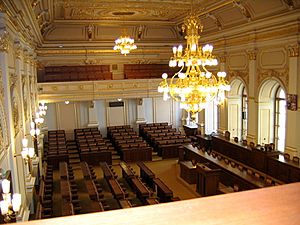Parliament of the Czech Republic facts for kids
Quick facts for kids Parliament of the Czech RepublicParlament České republiky |
|
|---|---|
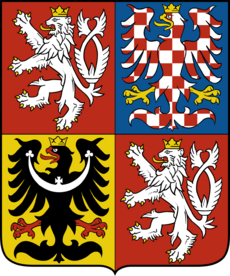 |
|
| Type | |
| Type | |
| Houses | |
| History | |
| Founded | 1 January 1993 |
| Preceded by | • Czech National Council • Federal Assembly |
| Leadership | |
|
President of the Senate
|
Miloš Vystrčil, ODS
Since 20 January 2020 |
|
President of the Chamber of Deputies
|
Markéta Pekarová Adamová, TOP 09
Since 10 November 2021 |
| Structure | |
| Seats | 281 81 Senators 200 Deputies |
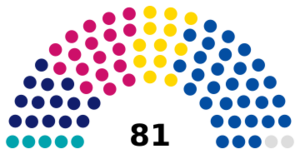 |
|
|
Senate political groups
|
Government Support (60)
Opposition (21)
|
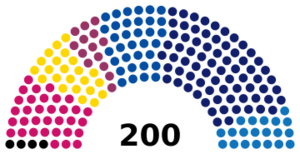 |
|
|
Chamber of Deputies political groups
|
Government (104)
Supported by (1)
Opposition (95)
|
| Elections | |
| Two-round system | |
| Proportional representation | |
|
Senate last election
|
20-21 September and 27-28 September 2024 |
|
Chamber of Deputies last election
|
8–9 October 2021 |
| Meeting place | |
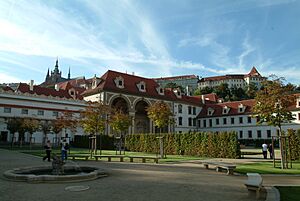 |
|
| Wallenstein Palace, meeting place of the Senate | |
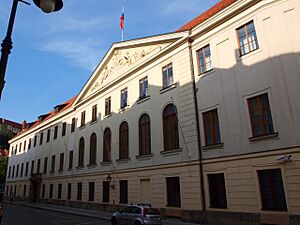 |
|
| Thun Palace, meeting place of the Chamber of Deputies | |
| Website | |
| Senate Chamber of Deputies |
|
The Parliament of the Czech Republic (which in Czech is Parlament České republiky) is like the main law-making body for the Czech Republic. It's where important decisions are made for the country. This Parliament meets in Malá Strana, a beautiful part of Prague. It has a total of 281 people working there, who are called members and senators.
The Parliament is made up of two main parts, like two separate teams, and people vote directly to choose who will be in each team:
- The first team is called the Senate.
- The second team is called the Chamber of Deputies.
The Parliament has many important jobs. It creates and approves new laws, and it can even change the country's main rulebook, called the Constitution. It also helps the Czech Republic work with other countries by agreeing to international deals. In special situations, it can decide about sending Czech soldiers abroad or allowing foreign soldiers in the country.
Contents
What is the Parliament of the Czech Republic?
The Parliament is the most important group for making laws in the Czech Republic. It helps to guide the country and make sure things run smoothly. Its work affects the daily lives of all citizens.
Two Important Houses
The Parliament is split into two main groups, or "houses," to help manage all its responsibilities:
- The Senate is often called the Upper House. It has 81 members, called senators.
- The Chamber of Deputies is known as the Lower House. It has 200 members, called deputies.
Both houses work together to create and pass laws for the country.
What Does the Parliament Do?
The Parliament of the Czech Republic has several very important jobs for the country:
- Making Laws: Its main role is to create and approve new laws. These laws affect everyone in the Czech Republic, from schools to roads to healthcare.
- Changing the Constitution: The Parliament can also change the Constitution, which is the most important set of rules for the country.
- International Agreements: It approves agreements with other countries, helping the Czech Republic work together with nations around the world.
- Decisions on Military: In special situations, the Parliament decides if Czech soldiers should go abroad or if foreign soldiers can come to the Czech Republic.
- Overseeing the Government: The Parliament also watches over the government to make sure it is doing its job well and following the laws.
How are Members Chosen?
The people who work in the Parliament are chosen by citizens through elections.
- For the Senate: Senators are elected for six-year terms. Every two years, about one-third of the Senate members are up for election. This helps keep the Senate stable.
- For the Chamber of Deputies: Members of the Chamber of Deputies are elected for four-year terms. All 200 members are elected at the same time in a general election.
These elections are a way for people to choose their representatives and have a say in how the country is run.
A Look at History
The idea of a modern parliament in the Czech lands started a long time ago. It began when the Czech lands were part of the Austrian Empire and later Austria-Hungary. Around 1861, a group called the Imperial Council was formed, which was an early version of a parliament.
How the Parliament Started
When Czechoslovakia became an independent country in 1918, it created its own National Assembly. This assembly took over the law-making jobs from the older councils. There were times in history (like between 1938-1939 and 1948-1989) when the country had a parliament, but the government was not chosen by the people. Later, in 1968, as Czechoslovakia changed, separate councils were made for the Czech and Slovak parts of the country.
From Old Councils to Today's Parliament
Today's Chamber of Deputies continues the work of the Czech National Council. This council played a big role in the Czech part of Czechoslovakia. The Senate, which is the other part of the Parliament, was created more recently in 1996. It was inspired by the Senate that existed in the early days of the First Czechoslovak Republic. This shows how the Czech Republic builds on its past to create its modern government.
See also
 In Spanish: Parlamento de la República Checa para niños
In Spanish: Parlamento de la República Checa para niños


